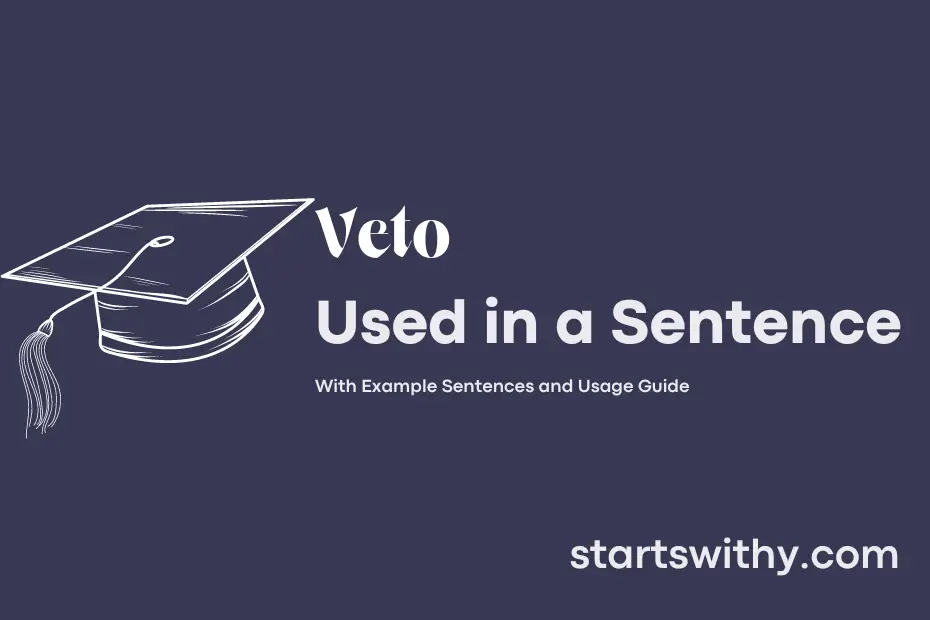When a person in a position of authority has the power to reject or prohibit a decision or proposal made by others, they are exercising a veto. This action effectively stops the suggested action from being carried out.
The veto power can be a significant tool in various settings, such as government decision-making processes, organizational leadership structures, or even casual group situations where one individual holds the authoritative position to veto particular choices.
7 Examples Of Veto Used In a Sentence For Kids
- Veto means saying no.
- The teacher has the power to veto some choices.
- When the teacher says veto, we have to choose something else.
- We cannot do something if there is a veto.
- Let’s listen carefully so there won’t be a veto.
- The word veto can stop a plan.
- We must understand the reason behind a veto.
14 Sentences with Veto Examples
- The college president has the power to veto any proposed changes to the academic calendar.
- The student council can choose to veto a motion if they feel it does not align with the interests of the student body.
- The academic committee has the authority to veto a student’s request for reinstatement after expulsion.
- The college board may decide to veto the budget proposal if they believe it is not fiscally responsible.
- The faculty senate has the ability to veto a new curriculum if they believe it does not meet academic standards.
- The sports committee can veto a new rule change if it is not agreed upon by the majority of team captains.
- The housing committee may veto a request for a roommate change if there are no valid reasons provided.
- The exam proctor has the right to veto a student’s request for extra time on an exam if it goes against university policy.
- The scholarship board can veto a student’s application if they do not meet the eligibility criteria.
- The event planning committee has the power to veto a proposed theme for the college festival if it is deemed inappropriate.
- The academic advisor can veto a student’s course selection if it does not fulfill their degree requirements.
- The student government can veto a decision made by the administration if it negatively impacts the student body.
- The college dean can veto a student’s appeal for a grade change if they believe it is unjustified.
- The ethics committee has the authority to veto a research proposal if it is deemed unethical or violates academic integrity standards.
How To Use Veto in Sentences?
Veto is used to indicate a decision or a right to reject or forbid something. When constructing a sentence with veto, it is important to understand its meaning and usage in context. Here is a simple guide on how to use veto in a sentence:
-
Subject-Verb-Object Structure: Start your sentence with the subject followed by the verb and then the object. For example, “The president has the power to veto legislation.”
-
Clarity: Ensure that the sentence is clear and concise, so the meaning of veto is easily understood. For instance, “The committee decided to veto the proposed budget.”
-
Context: Consider the context in which veto is being used to ensure that the sentence makes sense. For example, “The board will veto any changes to the original plan.”
-
Grammatical Accuracy: Pay attention to the tense and form of veto when using it in a sentence. For instance, “The governor may veto the bill next week.”
-
Variety: Experiment with different sentence structures and types to enhance your proficiency in using veto. For example, “Without the veto of the board, the project would have proceeded as planned.”
By following these guidelines, you can effectively incorporate veto into your sentences, conveying your message clearly and accurately.
Conclusion
In conclusion, the veto power allows a person or group to reject or block a decision made by others. This power is often used by political leaders to prevent laws or decisions they disagree with from being implemented. For example, the president can veto a bill passed by Congress if it goes against their agenda or beliefs. Additionally, the United Nations Security Council members can use their veto power to stop resolutions they do not support from being adopted.
Overall, the veto plays a crucial role in decision-making processes, providing a check and balance to ensure that decisions are not forced through against the wishes of key stakeholders. However, its use can also lead to deadlock and hinder progress if misapplied or overused.



